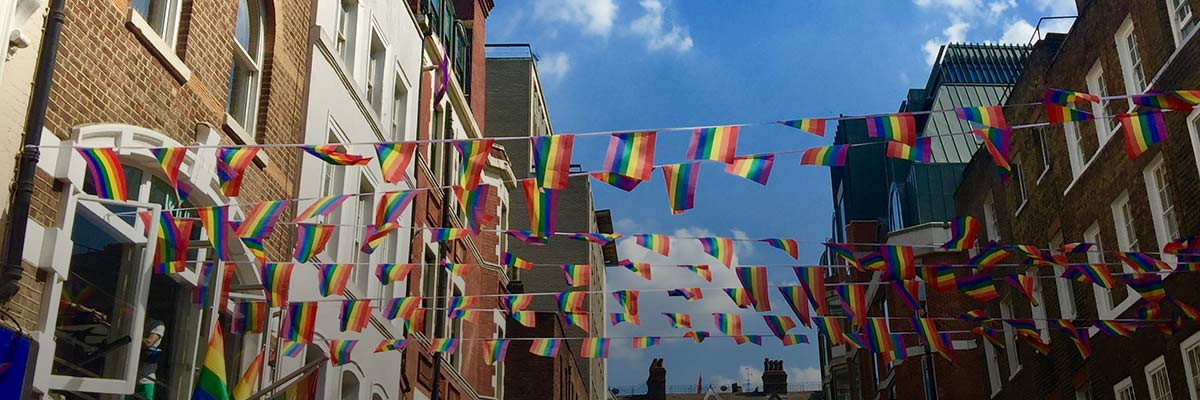
Authors
• The coronavirus will hit marginalized groups, including LGBTIQ+ people, hardest.
• The private sector must take collective action to cushion the blow.
• Businesses can consider three strategies when trying to ensure inclusion.
The COVID-19 pandemic has disrupted life as we know it on a scale never seen before. One inescapable point in this crisis is that it will take an increased toll on those groups who were marginalized, vulnerable, and excluded before the pandemic hit, including lesbian, gay, bisexual, transgender, intersex, and queer (LGBTIQ+) people. For LGBTIQ+ people who have experienced a lifetime of discrimination, especially in places with deep poverty, tenuous healthcare delivery systems, and fragile government infrastructure, the sober truth is that this global emergency presents immediate unimaginable challenges.
For example, as highlighted in a recent Openly article, in India transgender people are at heightened risk of poverty and ill health because they already exist on the margins of society. The UN Independent Expert on Sexual Orientation and Gender Identity recently wrote in an open letter about the impact of COVID-19:
“Homeless persons, among whom LGBTIQ+ persons are many, face exacerbated exposure to contagion.…Many LGBTIQ+ youth will now be forced to [isolate] within hostile environments with unsupportive family members or co-habitants.”
Ultimately, as OutRight Action International notes, in too many places—simply because of who they are and who they love—LGBTIQ+ people will have less access to healthcare, will be hard hit by unemployment and food scarcity, will see their already-thin margins disappear, and without life-saving interventions will fall sick and die.
For these reasons, OutRight has launched a COVID-19 Global LGBTIQ+ Emergency Fund to support queer organizations on the frontlines of the pandemic in all regions outside of North America and western Europe. The fund will distribute grants to grassroots LGBTIQ+ organizations that are addressing a range of community needs, including provision of emergency food and/or shelter, access to safe and competent healthcare, safety and security, financial stability, and other unforeseen negative impacts brought about by the pandemic. Fund participants benefit from our coordination, vetting, and distribution of money to capable local organizations in markets where they do business. This is but one example of how the private sector can link up with civil society to respond to the pandemic when systems and government fail or are insufficient.
As COVID-19 strengthens its indiscriminate grip, those of us in the business and social sectors are being asked hourly what more the private sector can do to effectively ensure that those most at risk are not left behind. Our answer: take collective action to address the immediate needs of those affected by COVID-19, while staying focused on and committed to long-held values that prioritize inclusion and equity.
In this regard, purpose-driven leadership has never been more critical. As each company and civil society organization addresses urgent needs in unique and important ways—from building hospitals and tech platforms to manufacturing medical equipment and delivering food to homebound older people—important trends are emerging with regard to the need for, and power of, collective action. Never before has the old adage “there is power in numbers” rung truer.
When the Partnership for Global LGBTIQ+ Equality (PGLE), a global leadership platform to accelerate LGBTIQ+ inclusion in collaboration with the World Economic Forum and BSR, was launched in January 2019 at the Forum's Annual Meeting, we could not have predicted that in only one year its raison d'etre—tackling discrimination in all its forms to ensure that the universal basic human rights of LGBTIQ+ people are acknowledged and upheld—would be a matter of life and death for hundreds of thousands that comprise our global community.
Today more than ever, the business community has an opportunity, in fact a responsibility, to demonstrate leadership. But it can’t do it alone. While the past decade has seen important progress in LGBTIQ+ inclusion in some parts of the world, in most countries, protection against discrimination based on sexual orientation and gender identity is inadequate at best.
Unless we act, discrimination, unequal access, and the denial of universal human rights will only compound the poverty and dislocation that LGBTIQ+ people face around the world and render long-term social and economic progress out of reach.
Three years ago, the Office of the United Nations High Commissioner for Human Rights, in collaboration with the Institute for Human Rights and Business, developed the UN Standards of Conduct for Business to support the business community in tackling discrimination against lesbian, gay, bi, trans, intersex, and queer people. These standards provide five concrete steps that companies can take to align their policies and practices with international standards on human rights of LGBTIQ+ people.
To date, nearly 300 companies have stood up in support of human rights and equality for LGBTIQ+ individuals by expressing support for the UN Standards. If your company has not stood up for the universal human rights of LGBTIQ+ people, now is the time to do so by adding your name to the list of companies supporting the UN Standards.
The pandemic will undoubtedly present a range of new challenges to democracy and human rights. It is undeniable that repressive regimes will use the pandemic in ways that serve their own myopic political interests at the expense of basic freedoms and people’s lives. Unless we act, discrimination, unequal access, and the denial of universal human rights will only compound the poverty and dislocation that LGBTIQ+ people face around the world and render long-term social and economic progress out of reach.
Our community and its allies cannot afford to stand idle, and we must not allow backsliding on hard-won LGBTIQ+ rights. We must accelerate our quest for inclusion, together. In addition to expressing public support for the UN standards, here are three strategies to guide our collective response:
- Apply a human rights lens to decision-making. Source accurate information when making data-informed decisions, ensure that those decisions are guided by application of a human rights lens and the UN Standards of Conduct for Business, and make sure responses prioritize the immediate and long-term recovery needs of the most vulnerable. In developing individual, sector-wide, and cross-sectoral actions, ensure that all affected stakeholders inform a coordinated, global strategy. Identify local stakeholders and global organizations with deep roots in local communities where you operate to understand their vulnerabilities and how your decisions impact them.
- Amplify your core values. Content is key in times of emergency. Now more than ever, people will need constant reminders that fear of the Other is the enemy and that inclusion remains the highest priority. Leverage all communications platforms to remind stakeholders that inclusion is a value that should underpin our response—and that inclusion means everyone. Dispel stigmatizing messages that harm vulnerable communities by countering them publicly.
- Prioritize collective action and share what you learn. It is critical that those in positions of authority around the world understand that none of us are too distracted to uphold basic universal human rights for all or that we are not too preoccupied to hold violators accountable. Through joint public statements or silent diplomacy, make your position known. Help others avoid mistakes and scale successful approaches, including innovative ones. Raise awareness of best practices and assist others in applying them. Now is the time for a big tent approach.
Months and years from now, when we look back on this time, we will be measured by our capacity to lead with purpose, kindness and compassion, and our ability to mobilize together to respond to the needs of our most vulnerable members of society. The time for bold action is now. Let us not fall short or fail to do absolutely everything we can.
First published on the World Economic Forum website.
The Partnership for Global LGBTIQ+ Equality (PGLE) is a collaboration between the World Economic Forum, the UN Office of the High Commissioner for Human Rights, and BSR.
Topics
Let’s talk about how BSR can help you to transform your business and achieve your sustainability goals.







